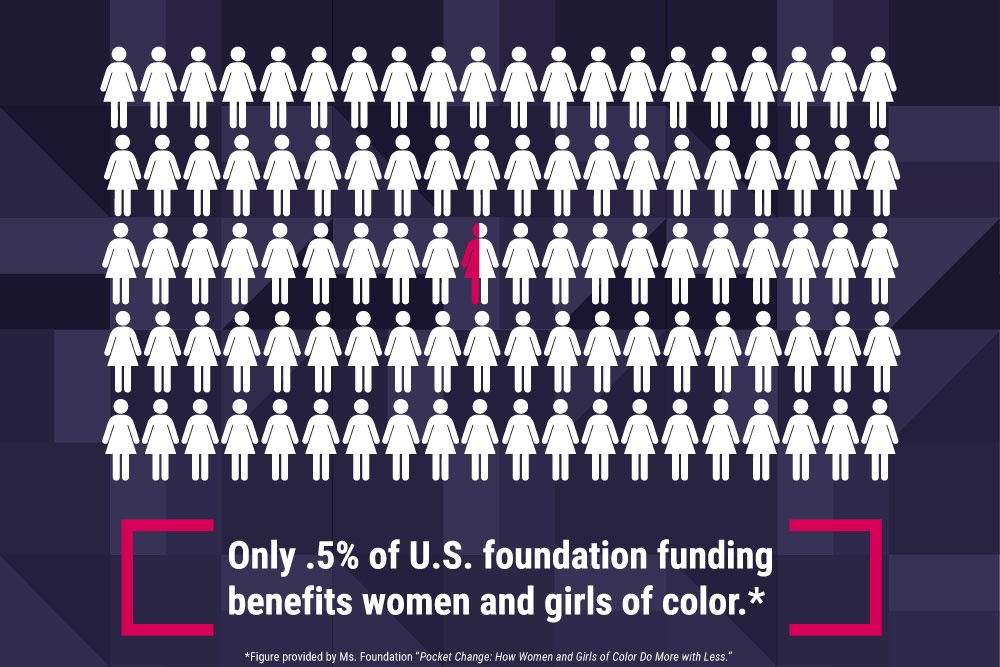
Moving Philanthropy Toward A More Just And Equitable Future
Guest Blog: For Philanthropy, Success Equals Abolition
Magenta Freeman of Denver is a member of the Women & Girls of Color Fund’s Advisory Council.
 As an anti-capitalist abolitionist, I struggle nearly constantly with the tension between my desire as an activist to bring about change in current systems, and my frustration with the current status quo. I wrestle both internally and externally as I engage with the omnipresent oppressive structures and practices inherent in the various industrial complexes (military, prison, nonprofit, etc.), in order to ultimately foster liberation. Of late, that tension has significantly impacted (and limited) my choices of clients and partners in my consulting work, as well as the organizations with whom I volunteer my time.
As an anti-capitalist abolitionist, I struggle nearly constantly with the tension between my desire as an activist to bring about change in current systems, and my frustration with the current status quo. I wrestle both internally and externally as I engage with the omnipresent oppressive structures and practices inherent in the various industrial complexes (military, prison, nonprofit, etc.), in order to ultimately foster liberation. Of late, that tension has significantly impacted (and limited) my choices of clients and partners in my consulting work, as well as the organizations with whom I volunteer my time.
Focusing my time toward the redistribution of wealth
Among the objectives I dedicate my limited energies to is the effective redistribution of wealth, particularly in a time when the wealth gap in America is ridiculously vast. It is that objective, and the desire to foster broader representation in such efforts, that led me to apply for The Women’s Foundation of Colorado’s Women and Girls of Color Fund Advisory Council. I was thrilled to be selected, and to meet with my counterparts in this work. My experience on the Council has been mixed; I have had the opportunity to participate in deeply moving and impactful moments, as well as had times of struggle, navigating the liminality between what is and what could be.
I have had the opportunity to participate in deeply moving and impactful moments, as well as had times of struggle, navigating the liminality between what is and what could be.
Among the important and impactful moments of my experience on the Council was the opportunity to contribute, through the Women and Girls of Color Fund’s rural grant cycle, to the mission of organizations that I’m familiar with and admire. Those include Herbal Gardens Wellness’ enlightening and healing work on behalf of the Native population of Colorado; as well as those of which I was previously unaware of, such as Integrated Community, whose work for the immigrant population of Routt County was far more expansive and impacting than their mission statement could ever convey. The likelihood that I could personally have the chance to contribute directly to, or even learn so much about such deceptively small, local orgs with far-reaching impacts, under any other circumstances, is certainly slight to none. It was a perspective-broadening experience for which I will be forever grateful.
Philanthropy is part of the problem and part of the solution
I have seen The Women’s Foundation leadership struggle to navigate this space between as well, and have come to sincerely believe their hope and intent is to successfully move philanthropy forward toward a more just and equitable future. As they attempt to navigate from the difficult position of being both a part of the problem (the hoarding and control of wealth by individuals and institutions) and a part of the solution (the shifting of power to marginalized people and toward more just funding practices), I’m certain they relate to the tension I and many other community organizers feel as we try to function as part of the very systems we’re trying desperately to transform. As Rodney Foxworth so profoundly stated in his Medium article, Philanthropy Will Not Save Us, “Philanthropy is not synonymous with social justice, social change, or even charity. In fact, philanthropy, like extreme poverty, is simply a byproduct of social, gender, racial, and economic injustice.”
The Women & Girls of Color Fund embodies a more equitable funding model
My hope is that The Women’s Foundation’s shift toward a more equitable funding model reflects a broader move in philanthropy from extractive to regenerative practices, and centers anti-capitalist, anti-oppression, and anti-racism work in the process. I’ve personally been excited to find orgs like Community Centric Funding, which is driving the charitable industry’s focus towards principles of belonging rather than othering, and transformative instead of transactional values; thereby creating a movement based upon such ideals. Another org helping to foster this shift is Justice Funders, who, in their Resonance Framework states: “It is time for philanthropy to embrace the principles of Just Transition. A Just Transition requires us to acknowledge the impact of the extractive economy on marginalized communities, repair the harms of our long history of exploitation and reject the continued accumulation of wealth and power in the hands of a few.”
My ultimate desire is that the concept of philanthropy soon becomes one that is relegated to the history books, for the sake of my grandchild’s generation; along with the carceral system, “Big Ag” and food insecurity, and all of the other by-products of the systems of inequity we are forced to navigate today.
The Women’s Foundation of Colorado is a nonpartisan organization. The opinions of guest bloggers are their own and do not necessarily reflect the opinions or positions of The Foundation.

